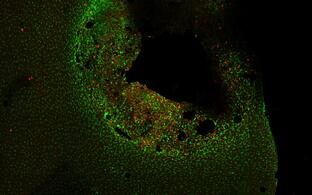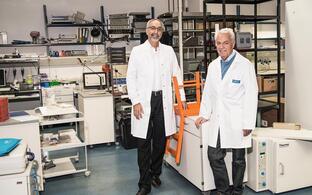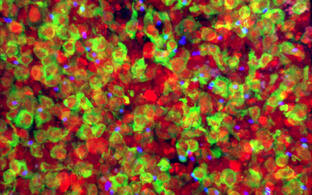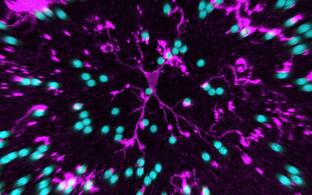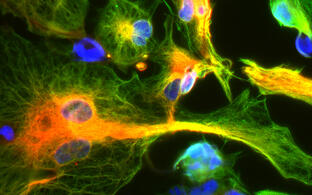
Kettenmann Lab
Cellular Neurosciences (Emeritus)
Profile
The functional role of glial cells is not as obvious: while they were first described as cells providing only structural support to neurons, a series of more recent studies on glial cell function has attracted the attention of the neuroscience community. It has become evident that glial cells are essential for the proper functioning of the brain.
Our goal is to understand the role of glial cells in physiology and pathology. We analyze how glial cells communicate among each other and with neurons. We determine how astrocytes and oligodendrocytes are connected via gap junctions and how the panglial network influences neuronal function.
We study the expression of transmitter receptors in microglial cells and how activation of these receptors influences microglial functions. Within the context of pathology we are currently studying the importance of microglial cells in stroke, Alzheimer’s disease and schizophrenia. Another line of research addresses the question how microglia interact with glioma cells. We aim to understand this interaction on a molecular level for the purpose of identifying therapeutic targets.
Research
Postdocs
Dr. Christiane Nolte.
Guest Scientists
PhD students
Olga Bakina
Is microglial cell population as homogeneous as we thought? My project is aimed to study molecular and morphological heterogeneity of microglia in normal brain and retina. We will apply Drop-seq and Patch-seq for the single cell RNA sequencing as well as microscopy analysis and functional assays to answer our questions.
Yimin Huang
The Role of microglia in glioma interaction. Specifically, my project aims to elucidate the potential synergistic or antagonistic effects of Toll like receptors on glioblastoma progression. Furthermore, I will investigate the potential role of PD-1/PD-L1 on glioblastoma progression. Methods involved in this research are common molecular biological technique like qPCR, Western Blot, imunnohistochemistry as well as tumor organic slice culture and tumor inoculation model.
Francesca Logiacco
Microglia clearly have the capacity to sense neuronal activity and may in turn affect neuronal networks. Since many microglial functions are known to be linked to intracellular Ca2+-/ cAMP-signaling, my research aims to investigate whether and how these two major second messenger pathways are involved in the microglia-neuron interaction by microglial calcium imaging and field potential recordings in different brain regions on acute mouse brain slices.
francesca.logiacco@mdc-berlin.de
Nirmeen El Madany
It becomes more and more clear that microglia play a role in the progression of brain diseases. VGF is a protein that is upregulated in Alzheimer’s disease and generated by glioblastoma cells, and it was previously shown to impact microglial functions. My research aims to figure out the interplay between VGF and microglia to evaluate if and how targeting VGF signaling in microglia could be used as a novel therapeutic strategy in glioma and Alzheimer’s disease.
nirmeen.elmadany@mdc-berlin.de
Medical students
Ibrahim Efecan Efe
Pharmacological intervention in glioma remains unsatisfactory. My aim is to investigate chemotherapeutic agents for their capacity to interfere in microglia-glioma crosstalk and their feasibility for targeted nanoparticle drug delivery to the brain. Through PCR, western blotting, organotypic brain slices and immunohistochemistry, I further explore potential target genes that may play a major role in the tumor metastasis- and invasion-promoting activity of microglia.
IbrahimEfecan.Efe@mdc-berlin.de
Hannah Haneke
My research is about investigating new therapeutic approaches for Glioblastoma, the most common and malignant primary adult brain tumor with a median survival of under 2 years. As not only tumor cells, but also the microenvironment contributes significantly to the devastating prognosis, my research focusses on glioma- microglia- crosstalk. More specifically, we elaborate importance of a large glycoprotein in this context with various methods including organotypic brain slices, Western Blots and immunohistochemistry.
Fatih Yalcin
Glioblastoma multiforme (GBM) is the most aggressive cancer in the brain and associated with poor survival and limited range of treatment. Previous research identified microglia, the first and main form of active immune defense in the central nervous system, as contributors to tumor growth and invasion. My research aims to characterize through basic molecular biology and immunohistochemistry this glioma-microglia crosstalk as potential target for future treatment.











